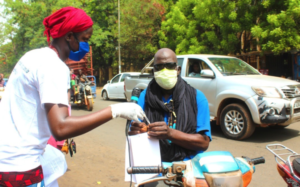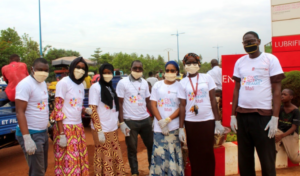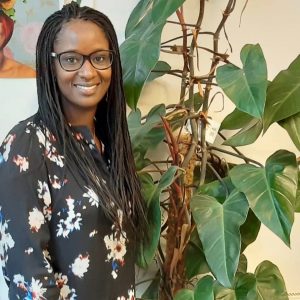Pour lire en français, cliquez ici.
Battling misinformation is always a challenge. It’s even more of a challenge if the population you serve has varying degrees of literacy and uses a variety of channels to access information. At Accountability Lab Mali, we are tackling this challenge head-on as we quash rumors about the Coronavirus.
Accountability Lab Mali is part of the Accountability Lab network present in more than 10 countries in the world. Founded in 2016, composed by a team of motivated individuals working hard to make governance work for everyone by supporting active citizens, responsible leaders and accountable institutions. Our goal is a world in which resources are used wisely, decisions benefit everyone fairly and people lead secure lives.
Since the 2012 coup d’état, Mali has been caught in a multidimensional crisis of territorial social, political and security issues. Over the last few months, we have witnessed widespread protests demanding the resignation of the incumbent president, leading to a coup d’état on August 18th, 2020. Much of this instability stems from a series of socio-political crises caused by corruption, bad governance, and a lack of social justice. Due to a lack of communication on key issues (war, insecurity, management of public funds under a cloud of corruption scandals, etc.) the Malian population often feels abandoned by the government, leaving them in a state of uncertainty and constant distrust as the situation escalates.
Mali and several other African countries reported their first positive case of Covid-19 much later than Asian or European countries. Following the news, we could see how the virus was killing thousands of people per day. Unfortunately authorities did not communicate the severity of the situation effectively. A few banners in the cities, daily written reports despite a low literacy rate, and mitigation measures communicated by the government were used to reach communities, but the government didn’t relay a proper action plan.
Over time, the lack of updated information and the impact of fake news created a lot of misconceptions. Fake documents have been created with the logo of trusted international organizations (eg. UNICEF) giving credibility to false information. One of the most persistent rumors is that the virus cannot survive in hot temperatures. This misinformation led people to question the existence of COVID-19 and practices such as wearing masks. I have been asked several times why I wear a mask in the market, a place full of people in close proximity. The current socio-political crisis adds fuel to the fire, as the bigger challenges overshadow the pandemic, and social distancing and other safety measures are neglected daily.
In response to misinformation in the COVID-19 pandemic, Accountability Lab Mali launched the Civic Action Teams (CivActs) aimed at combating information gaps between the government, media, NGOs and citizens. We are especially focused on debunking rumors regarding the COVID-19 pandemic, as it remains a mystery for a lot of people. We fight this misinformation by sharing validated information from trusted sources. Our team gathers misinformation through social media and our Community Frontline Associates (CFAs) from various parts of the country. Then, we find verified, accurate information by liaising with relevant authorities. We turn this accurate information into accessible bulletins that we share on different social media platforms, such as WhatsApp, Facebook, Twitter, and Instagram.
What is a bulletin?
– Data on deaths, case count, recoveries, etc.
– Debunking rumors that are circulating with accurate information
– Infographics with advice/best practices for social distancing and other safety measures, as well as information on where services can be accessed
Combatting misinformation is particularly challenging in the Malian context. Mali has a literacy rate of 50% and an extremely fragile, if not non-existent, public education system which has experienced incessant strikes of more than 6 months a year for the last two years. It’s becoming an obligation to adapt our work and make sure that it can reach the most marginalized communities in our country. Here’s how we’ve adapted so far:
- We create bulletins in both French and Bambara. French is the national language, but Bambara is the most spoken language in the country and greatly increases our reach. Using the local language ensures that we are inclusive to more Malians.
- In order to reach low-literacy populations, we prioritized creating infographics. These visual bulitiens make the information clear and accessible to all, regardless of their ability to read.
- We also prioritized listening to those we serve directly. We organized several field trips to talk to communities and distribute protection kits. Through these conversations, we measured Malians’ perceptions of the coronavirus. Their responses confirmed for us that many people question the pandemic, which pushed us to continue our work sharing accurate health information.


Coronavirus CivActs teams deliver protection kits and foster conversations with citizens to find out their perceptions about the coronavirus.
Through our Coronavirus CivActs work, we have learned a few key things.
- First, there is an urgent to fight for amore inclusive society where every voice can be consult
ed and heard. A lot of people are still excluded from the decision-making process, especially women, young people and other marginalized groups. That creates a lot of frustration with the political system among young people, women and the population in general. A leadership that listens would strengthen trust between power holders and citizens, which is crucial during crises such as a pandemic. This multidimensional crisis serves as an important reminder of the importance of listening to the population and being accountable to them. - Second, our work on the bulletins has taught us that in order to increase our reach, we need to adapt our communications to local habits. Many Malians keep in touch with their friends and family using Whatsapp voice notes, so this is an area where we could expand our reach. We hope to create voice notes in local languages (Bambara, Fulani, Sonrai depending on the region where the info is disseminated) to reach the most marginalized communities. In other communities, we want to expand our reach by investing more in radio.
- Finally, this experience makes me eager to expand the ways in which we create feedback loops with communities. When distributing protection kits, community members gave us such useful insight and perspective on how they perceive the pandemic. We hope to gather more meaningful and substantive insights from our target audience in the future through focus group discussions.
The fight against COVID-19 and related information is not over. As the virus and rumors continue to spread, Accountability Lab Mali will keep adapting our Coronavirus CivActs campaigns. We will strive to reach new audiences by expanding our language offerings and our channels, with a focus on inclusion. At the heart of our work, we are committed to creating active citizens, and that all starts by empowering them with accurate information.
 As the head of the Monitoring, Evaluation and Learning department at Accountability Lab Mali, Doussouba Konaté is catalyzing a new generation of active citizens and accountable leaders to develop and implement positive ideas for greater integrity. Mali has faced a multidimensional crisis since the 2012 coup d’état. The weakness of the government has allowed the occupation of terrorists and rebel groups in Northern Mali. In this kind of context, it is extremely important to return to the local populations and victims of this conflict, to give them a voice and allow them to contribute to the national dialogue.
As the head of the Monitoring, Evaluation and Learning department at Accountability Lab Mali, Doussouba Konaté is catalyzing a new generation of active citizens and accountable leaders to develop and implement positive ideas for greater integrity. Mali has faced a multidimensional crisis since the 2012 coup d’état. The weakness of the government has allowed the occupation of terrorists and rebel groups in Northern Mali. In this kind of context, it is extremely important to return to the local populations and victims of this conflict, to give them a voice and allow them to contribute to the national dialogue.
Citizens and communities are rarely consulted about the decisions that affect their lives, particularly in hard-to-reach places. Where information is collected from them, the process is extractive, with very little feedback on how this data is used. Systemic corruption, opacity, discrimination or mismanagement by local governments and companies often prevents people from making their voices heard on issues they care about. Where trust in authority is low, rumours and misinformation can create negative feedback loops that further divide communities.
The Civic Action Teams (CivActs) ensure that everyone understands how and when development will take place, building accountability into local decision making in real-time, and closing the feedback loop between citizens, governments, the media and the private sector. Accountability Lab collects the perceptions of Malian citizens on a specific subject and in a specific geographical area and then disseminates that information to the population and decision-makers at many levels to create policies that are better adapted to the needs of the population. As a Feedback Fellow, Doussouba Konaté is excited to share her learnings from the CivActTeams program. She is looking forward to learning from other fellows about useful tools and technology to make the feedback process simple.







